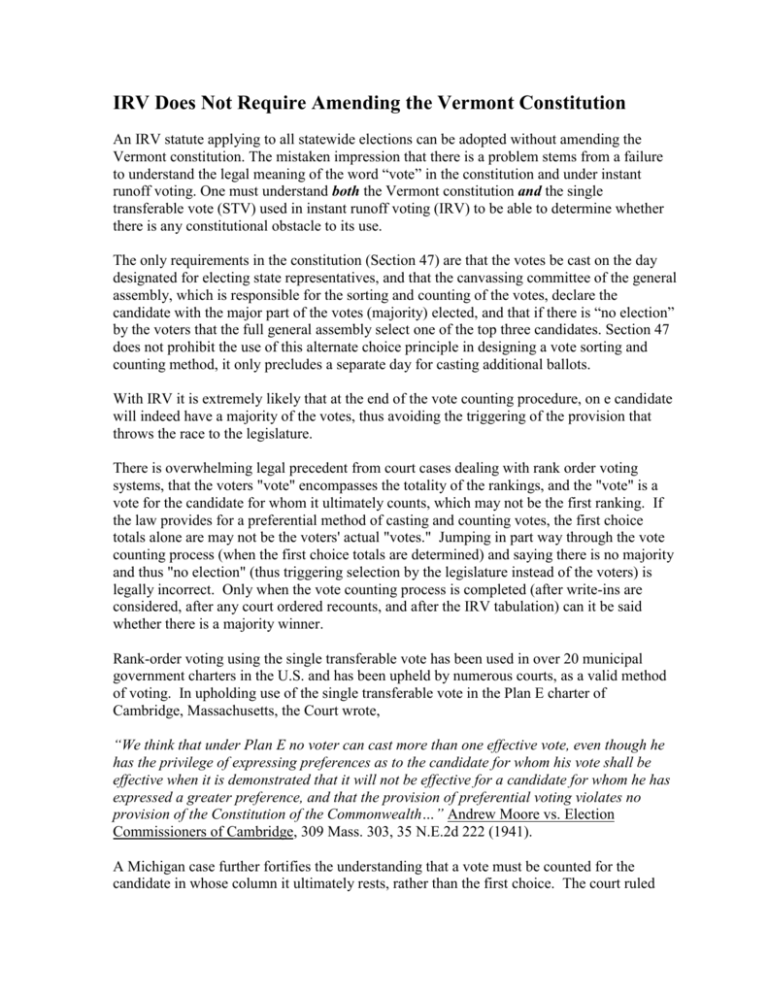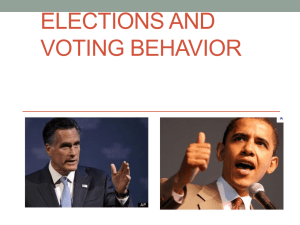What are the constitutional concerns
advertisement

IRV Does Not Require Amending the Vermont Constitution An IRV statute applying to all statewide elections can be adopted without amending the Vermont constitution. The mistaken impression that there is a problem stems from a failure to understand the legal meaning of the word “vote” in the constitution and under instant runoff voting. One must understand both the Vermont constitution and the single transferable vote (STV) used in instant runoff voting (IRV) to be able to determine whether there is any constitutional obstacle to its use. The only requirements in the constitution (Section 47) are that the votes be cast on the day designated for electing state representatives, and that the canvassing committee of the general assembly, which is responsible for the sorting and counting of the votes, declare the candidate with the major part of the votes (majority) elected, and that if there is “no election” by the voters that the full general assembly select one of the top three candidates. Section 47 does not prohibit the use of this alternate choice principle in designing a vote sorting and counting method, it only precludes a separate day for casting additional ballots. With IRV it is extremely likely that at the end of the vote counting procedure, on e candidate will indeed have a majority of the votes, thus avoiding the triggering of the provision that throws the race to the legislature. There is overwhelming legal precedent from court cases dealing with rank order voting systems, that the voters "vote" encompasses the totality of the rankings, and the "vote" is a vote for the candidate for whom it ultimately counts, which may not be the first ranking. If the law provides for a preferential method of casting and counting votes, the first choice totals alone are may not be the voters' actual "votes." Jumping in part way through the vote counting process (when the first choice totals are determined) and saying there is no majority and thus "no election" (thus triggering selection by the legislature instead of the voters) is legally incorrect. Only when the vote counting process is completed (after write-ins are considered, after any court ordered recounts, and after the IRV tabulation) can it be said whether there is a majority winner. Rank-order voting using the single transferable vote has been used in over 20 municipal government charters in the U.S. and has been upheld by numerous courts, as a valid method of voting. In upholding use of the single transferable vote in the Plan E charter of Cambridge, Massachusetts, the Court wrote, “We think that under Plan E no voter can cast more than one effective vote, even though he has the privilege of expressing preferences as to the candidate for whom his vote shall be effective when it is demonstrated that it will not be effective for a candidate for whom he has expressed a greater preference, and that the provision of preferential voting violates no provision of the Constitution of the Commonwealth…” Andrew Moore vs. Election Commissioners of Cambridge, 309 Mass. 303, 35 N.E.2d 222 (1941). A Michigan case further fortifies the understanding that a vote must be counted for the candidate in whose column it ultimately rests, rather than the first choice. The court ruled that the candidate in Ann Arbor’s instant runoff voting (called Majority Preference Voting, or M.P.V.) election of mayor who had had the second most first-choice rankings had a majority of the votes in the final round , or “final analysis” of the votes. The court wrote: “Under the "M.P.V. System", however, no one person or voter has more than one effective vote for one office. No voter's vote can be counted more than once for the same candidate. In the final analysis, no voter is given greater weight in his or her vote over the vote of another voter, although to understand this does require a conceptual understanding of how the effect of a "M.P.V. System" is like that of a run-off election. The form of majority preferential voting employed in the City of Ann Arbor's election of its Mayor does not violate the oneman, one-vote mandate nor does it deprive anyone of equal protection rights under the Michigan or United States Constitutions.” Stephenson v. Ann Arbor Board of City Canvassers, File No. 75-10166 AW Michigan Circuit Court for the County of Jackson In upholding preferential voting in New Jersey in Orpen v. Watson, 87 N.J.L. 69, 93 A. 853, affirmed 88 N.J.L. 379, 96 A. 43 the court wrote “as it is only the choice votes which go to make a majority that are counted as effective votes, and as no voter can vote for the same person but once in expressing his different choices, he can in no way cast more than one vote which can be counted for each office to be filled, because none of his other choice votes enter into or influence the result” Page 73, of 87 N.J.L., page 855 of 93 The Vermont Supreme Court ruled that the fact that the language about voting in the Vermont constitution was written before the invention of newer voting methods, does not mean they cannot be incorporated into the meaning of Section 47. Here is what the Vermont Supreme Court wrote in the only case ever dealing with this section of the constitution, Temple v. Mead in 1832: “in giving a construction to a constitution which was to secure the rights and liberties of the citizens, and which was intended to present a frame of government and a mode of election for future generations, as well as for the one then on the stage, we are to regard its spirit, and endeavour to give effect to its provisions, without regarding too strictly the literal meaning of the terms made use of…We ought not to believe that it was intended that voting for those officers should always continue in the same particular manner, or that the votes should be of the same materials, or in the same way which was then in use, without any regard to the changes which might take place, or the improvements which might be made. This limited view of the constitution would wholly destroy the statute passed in 1815, under which our elections are now made.” Likewise, the Court of Appeals of the State of New York in Johnson v. New York, 274 N.Y. 411, 430, 9 N.E.2d 30, 38 in upholding the use of preferential voting in New York City wrote that “We must always be careful in approaching a constitutional question dealing with principles of government, not to be influenced by old and familiar habits, or permit custom to warp our judgment. We must not shudder every time a change is proposed.”








